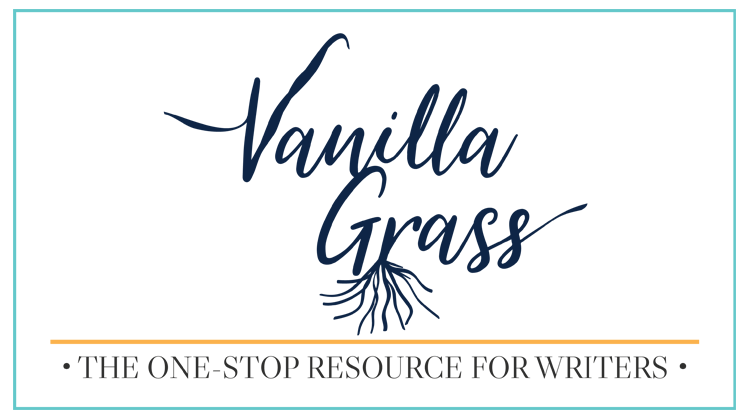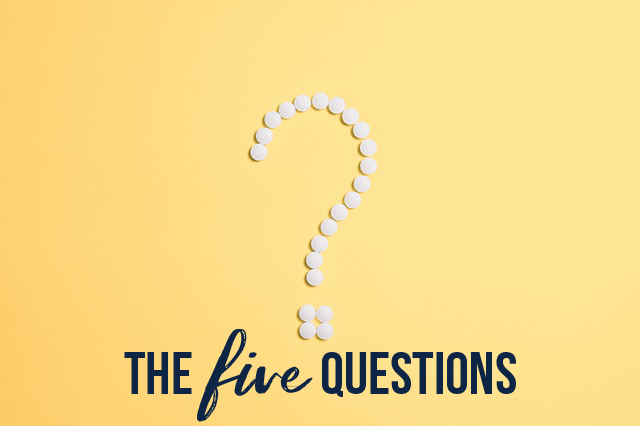In the Beginning

While every story has to begin somewhere, the way you open your novel sets the tone for your entire book. So, how do you start writing a book or novel?
On the first page, you’ll make promises to your reader (that you will keep), you’ll introduce the setting, develop characters (at least the main one), add emotions, and define goals.
Or that’s what you should be striving for within the first few pages. But that’s easier said than done. Don’t worry, this blog post is here to help you know what to do.
Because when you carefully write your first sentence, your first paragraph, and your first page, your readers can tell what kind of author you are and if this is a book they want to read. When written correctly and well, they will turn the page to the next. That goes with agents and publishers too.
Readers have subconscious expectations every time they pick up a book. As you read further to learn what these expectations are and how to meet them, you’ll be on your way toward writing ‘The End’ on something great, not just a train-wreck.

For example
As an illustration, consider you’re meeting someone (let’s call him Mack the Shark) about a new business opportunity in an unfamiliar part of town. The warehouse you meet in is dark, with liquid dripping from somewhere in the shadows.
Mack waves around some plans, promising you that they’re great, but he never actually shows them to you. “You’ll love it. It will be the best. You’ll make lots of money. I’ll get my guy to call you. Don’t worry about the details.”
But you’re smart and you want some answers. “Who will call me? What commodity are we even discussing? What’s at stake if I don’t go through with your plans? And what if I do?”
Similarly, your readers are asking these same questions. Who am I reading about? Furthermore, why should I care? What’s the worst that can happen to the characters and why is it important?
So, how do you rise to the challenge of meeting these expectations?
First of all, you have to know what questions to ask yourself before you start writing.
The Five Questions Every Writer Should Ask to Start a Book Off Right
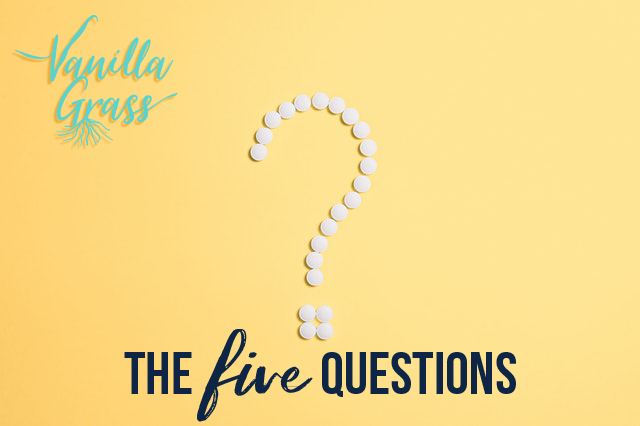
The questions you’ll learn below are essential for authors to ask themselves before they write a word.
People read for different reasons. Some want to relax, or escape, or pass time. Many want to learn empathy, while others are learning how to improve their writing. Some are reading manuscripts searching for the next breakout author–hopefully you! Regardless, everyone subconsciously wants to connect with the characters on the page.
While eloquent prose can be helpful, it can’t carry a whole story that lacks emotion. In addition, ornately detailed world-building won’t cut it either. Stories need to feel real enough to breathe, even if they’re full of uni-ogres in a pony world with clandestine missions to blow up Sagitarianuse’s moon.
Question #1 for Writing a Novel
What tone is appropriate?
Vanilla Grass
For as long as you’ve been setting pen to paper, you’ve probably heard or read how to begin a story:
Create an amazing hook!
Start with action!
Don’t start with dialogue!
Indeed, these are good points and can work for many novels. But following these directions aren’t enough (or always best).

Start with Tone
Are you writing a thriller? Make sure the hair on the back of my neck is raised by the second or third word. If you’re writing a romance and want me to swoon at some point in the book, then make sure my stomach flutters within the first few paragraphs–better yet, the first.
Sci-fi should give me some nerdy, techy jargon with a sense of life-threatening drama. Fantasy, even those that start in our contemporary world, should give me hints that things aren’t as they seem. The same goes for magical realism.
Tone is also used to let the reader know if they should grab a pack of tissues, or use the bathroom before they pee their pants from laughing too hard–or screaming.
Why is tone so important?
Tone establishes a promise. And promises made and kept are essential to the author/reader relationship.
As an illustration, consider a romantic relationship. If there are no forms of promises made between partners, why would either stay committed? Or imagine a business deal without even a verbal contract–one or both parties would back out.
So why would a reader invest eight or twenty hours in your novel if you don’t promise them something at the start of your book?
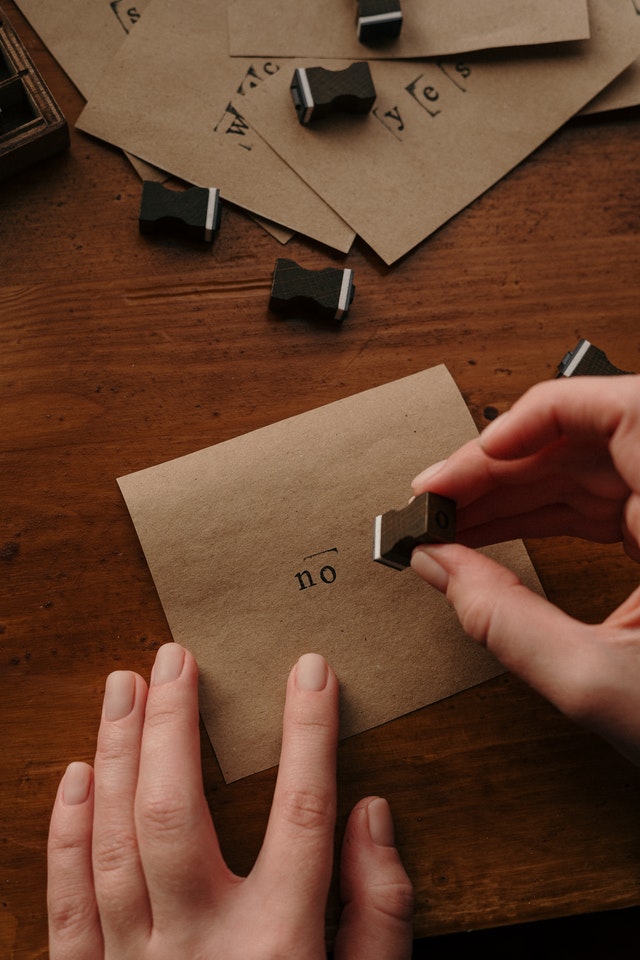
The answer is: they won’t.
If you want your readers to keep turning pages, then you need to give them hints about what kind of story they are reading from the beginning, specifically the first page, paragraph, and sentence if you can pull it off.
Further, readers shouldn’t have to see a title or look at the picture on the front to know what they are getting into. Imagine all of your readers start only from the first page. What tone do you want your reader to notice?
You’re now a tone-empowered pro.
Question #2 for Writing a Novel
What emotion do you want your reader to feel?
Vanilla Grass
I can’t tell you how many books I’ve put down because of a lack of emotion on the first page, or even the first chapter.
When characters go through tasks without a reason why, without an emotional response driving them, I give up.
Your readers will too.
Tone and emotions are easily confused but incredibly different. To compare, remember that tone is what you’re promising. Emotion is constantly changing.
At least it should be. Who wants to read a book about a character who is happy all the time? Or sad? Even Disney’s Inside Out shows emotion-based characters who change sides.
Why do you have to use multiple emotions?
Too much of one thing is ALWAYS too much.
Do you understand the difference between tone and emotion yet? One is a tool you use to make promises, the other is a feeling.
In other words:
Tone is the vehicle to carry your story, it’s the basis for plot and action. Emotion is the gas (or electricity for you cool, hybrid-type folk). The book can’t go anywhere without making the reader care. And your audience will care when you imbue your first page with emotion.
The Type of Emotion Matters

Emotions can assist in establishing your tone (a sad character could lend itself well to creating a sad book). But your emotion can be opposite to your tone, as well. Whichever you choose, the feelings need to be present and driving your character.
Why did your MC cross the road? Because they were just dumped and need a choco-chunk, peanut butter blaster shake from The Ice Shack.
Why did your MC blow up the Jorganzy’s home world? Because the Jorganzy’s blew up his mother’s collection of nineteen-eighties mannequins (oh, and his mother too).
We don’t need all of the backstory yet. Or maybe ever. But we need to feel the emotion. Make your character pissed, ecstatic, flippant, broody, whatever. Just make sure we feel it and make sure there’s an actual reason behind it.
Why is emotion so important at the start of a book?
It’s the easiest way for a reader to connect. Everyone has felt probably every emotion there is to some degree or another, so when you start with an emotion, readers can put themselves in the shoes of your character.
Question #3 for Writing a Novel
What opinion do you want your reader to form about your main character?
The beloved main character… he/she/it is full of flaws and weaknesses that need to be overcome (or not if you’re writing tragedy).
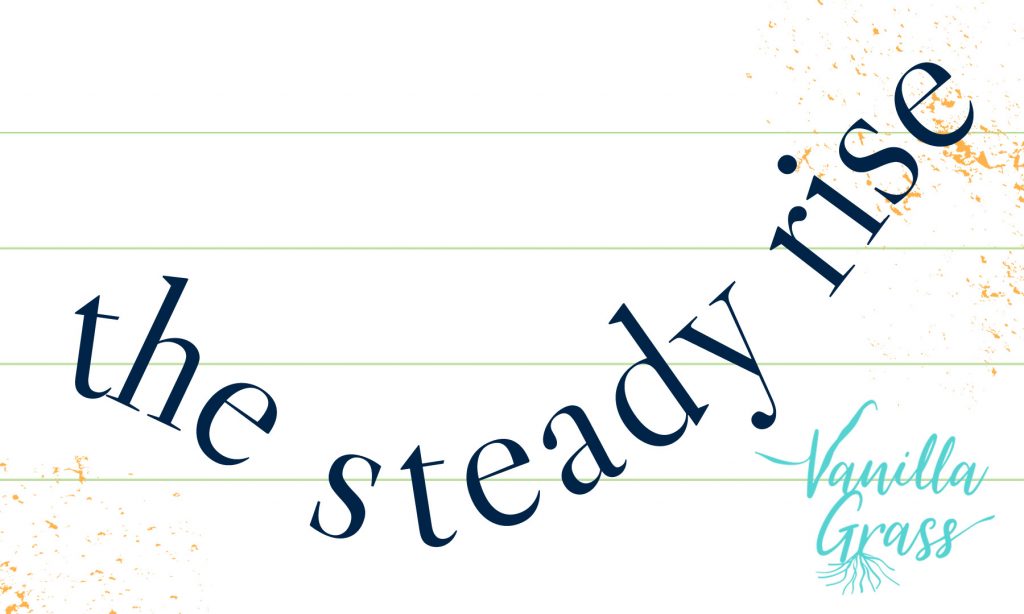
The way your character appears on the first page makes an impression on your reader. Make your character too horrid or abrasive and you may lose parts or all of your audience. Make them too sweet or perfect and you’ll have many of us gagging–and setting your book down.
So how should you portray your character?
By asking what opinion you want your reader to have of them from the very start of your book. If your goal is to redeem your character in the end, you will want your reader to feel like this is possible (hint, this is another promise you can make).
For instance, you can have your character “Save a Cat.” I hear there’s a good book with that same title floating around.

Blake Snyder titled his craft novel, Save the Cat, for a reason. Your readers need to form opinions about your character that allow them to believe he/she/it can change–unless you’re writing a tragedy. But even if you’re writing a tragedy, your writers still want to see change.
In contrast, if your character has no chance of turning good, let us see her do something so despicable that she can’t come back from it. But maybe still lead her to do something good. Because remember:
Too much of one thing is ALWAYS too much.
Your character needs to change, but they have to start somewhere.
Imagine you’re the main character in your book. How do you want others to see you? Do you appear as an underdog? Are you useless except for one very specific skill that could potentially save the world? Maybe you’re one heartbreak away from disaster?
Start your book where you can showcase an aspect of your character that will help readers form the opinion you want.

The window into the soul of your character at the start of your book should be specific because if done correctly, it will lead us to our next question.
Question #4 for Writing a Novel
What’s at stake?
Vanilla Grass
A book without conflict is just a lot of useless words on paper. Yes, you can quote me on that.
A book without conflict is just a lot of useless words on paper.
Dedra Tregaskis
Readers turn to stories for the reasons mentioned above, but they also want to know how others get through the crap. We all go through trials, heartaches, and pains sprinkled with afflictions, and we want to know how to do it better.
“How can I survive the next mountain I have to climb?”
“Is it possible to get through one more thing without acting like a jerk?”
Stories help.
How? Because if we connect in a story, we can subconsciously learn from the mistakes and triumphs of the characters we read about.
For instance, when I’ve read historical fiction or non-fiction accounts about the holocaust, I usually keep my mouth shut about any problems I’m having for days. Maybe even weeks. In other words, well-written stories create perspective.

Effective writing can have powerful impacts on our lives.
And the impacts result from conflict. If you think of a good story as gossip, you can understand the need to torture your characters. Gossipers don’t sit around praising people. Specifically, they dish up dirt, hanging up other’s dirty laundry and all the things wrong in the world–and people stop to hear it.
Furthermore, there’s this multi-billion dollar industry you may have heard of called the news. Yeah, it feeds off of conflict.
Conflict makes for good stories.
And it works best in your novel if you show up-front what’s at stake.
In my current WIP, I drop a clue on the first page that my main character has a secret that only she knows–that she has to keep. Page by page, I add in more detail, building up the tension of this secret. By the end of the chapter, you know what that secret is and how disastrous it will be if she tells anyone. (And my readers know they can trust me because I’ve answered some of their questions). But you also know that if the MC doesn’t tell, the lies she creates to cover everything up will devour her.
The damage to others and the damage to herself is what’s at stake.
Sometimes I like to ask myself another question that helps to establish the root conflict.
What is my audience dying to know?
Put another way, Why is my audience willing to read to the end?
If you don’t have an answer to this question, your book needs to simmer a little longer. There has to be a reason for someone to spend precious hours of their life to find out the answers to their questions.

So if you want to have readers who finish your book, and rave about your book, get that question in their mind as soon as possible. You don’t have to spell it out. Please don’t. Give little bits of gold dust, occasionally rewarding your reader with nuggets, until you lead them to the treasure-filled cave.
Now that you’ve established what’s at stake and are imagining how you’ll weave it into the first paragraphs or pages in your story, you’re ready for the last question on how to start a book.
Question # 5 for Writing a Novel
What is the goal?
Vanilla Grass
Good stories have well-developed characters. Great stories have well-developed and proactive characters.
If you did the legwork above to establish what’s at stake at the start of your story, your goal should come easy.

My main character wants to keep the secret while saving herself (something she can’t entirely do). Harry Potter wants to defeat Voldemort without anyone helping or getting hurt (not really possible). Bella Edward wants to be a vampire, have Edward forever, and still maintain some benefits with her hotty wolf-friend Jacob (again, not entirely possible).
The sooner you hint at the stakes at the start of your book, the sooner you hint at the character’s goals, and the sooner we get sucked into a story. Yes, you still need some set-up, but there is a line where readers get bored with too many descriptions and backstories.
So when those blog articles tell you to start with action–I wholeheartedly agree. Get us to the heart of the story–the ultimate question of why the audience should read to the end–as soon as you can. That’s the action.
How Do I Start Writing My Book?
Print off our free worksheet to use when you ask yourself the five questions. And check out our free downloads page for more writing helps.
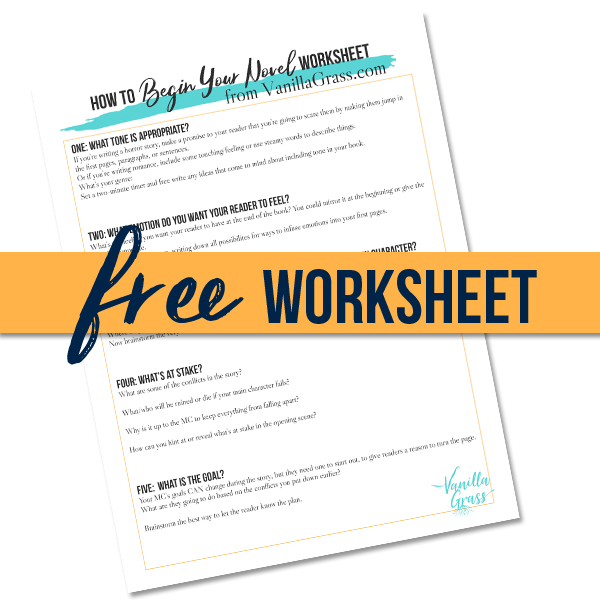
One: What tone is appropriate?
Two: What emotion do you want your reader to feel?
Three: What opinion do you want your reader to form about your main character?
Four: What’s at stake?
Five: What is the goal?
Combine the tactics you’ve read here with our other writing tips like our article on Story Structure or Writing Basics to keep readers coming back for more.
If you think you’ve mastered these elements of story-telling beginnings, send us your first page for critique. We review and post one page a week.

You can also drop us an email or comment anytime, we love to hear from you! And most importantly, keep writing!
